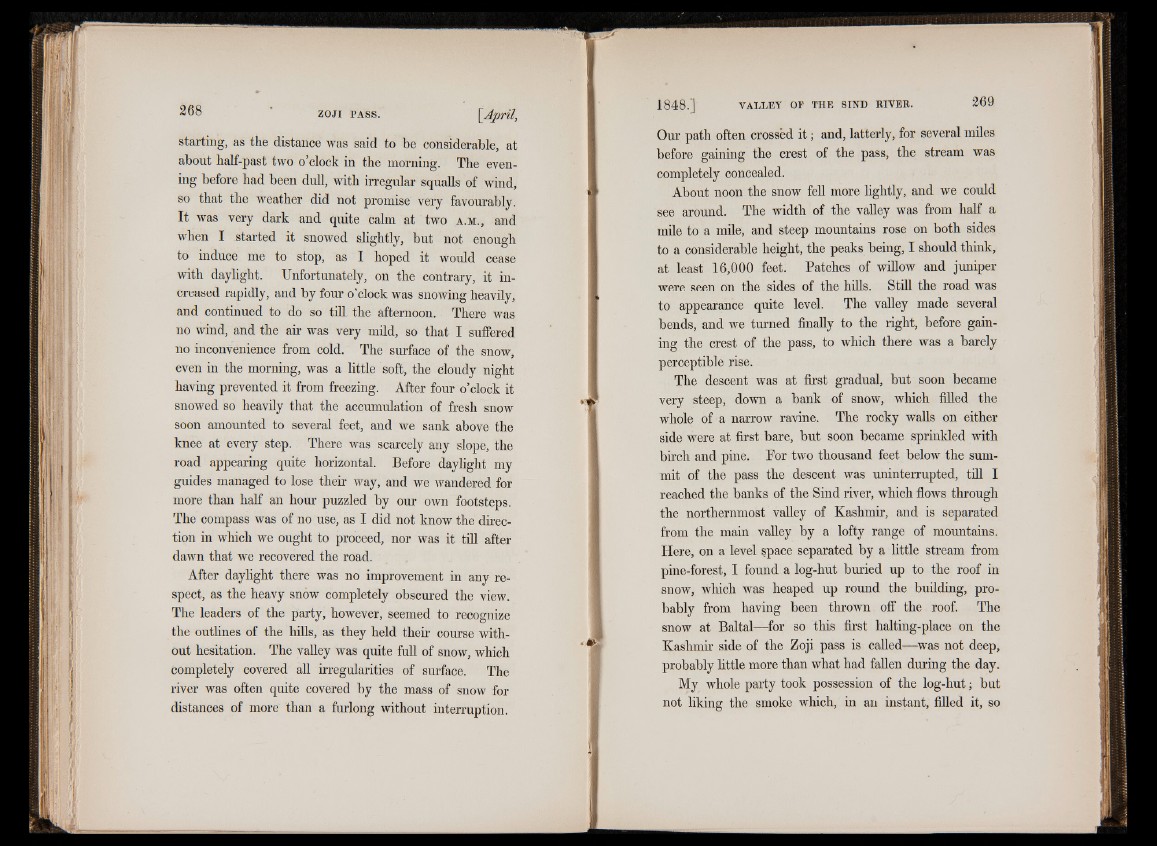
starting, as the distance was said to be considerable, at
about half-past two o’clock in the morning. The evening
before had been dull, with irregular squalls of wind,
so that the weather did not promise very favourably.
It was very dark and quite calm at two a .m ., and
when I started it snowed slightly, but not enough
to induce me to stop, as I hoped it would cease
with daylight. Unfortunately, on the contrary, it increased
rapidly, and by four o’clock was snowing heavily,
and continued to do so till, the afternoon. There was
no wind, and the air was very mild, so that I suffered
no inconvenience from cold. The surface of the snow,
even in the morning, was a little soft, the cloudy night
having prevented it from freezing. After four o’clock it
snowed so heavily that the accumulation of fresh snow
soon amounted to several feet, and we sank above the
knee at every step. There was scarcely any slope, the
road appearing quite horizontal. Before daylight my
guides managed to lose their way, and we wandered for
more than half an hour puzzled by our own footsteps.
The compass was of no use, as I did not know the direction
in which we ought to proceed, nor was it till after
dawn that we recovered the road.
After daylight there was no improvement in any respect,
as the heavy snow completely obscured the view.
The leaders of the party, however, seemed to recognize
the outlines of the hills, as they held their course without
hesitation. The valley was quite full of snow, which
completely covered all irregularities of surface. The
river was often quite covered by the mass of snow for
distances of more than a furlong without interruption.
Our path often crossed i t ; and, latterly, for several miles
before gaining the crest of the pass, the stream was
completely concealed.
About noon the snow fell more lightly, and we could
see around. The width of the valley was from half a
mile to a mile, and steep mountains rose on both sides
to a considerable height, the peaks being, I should think,
at least 16,000 feet. Patches of willow and juniper
were seen on the sides of the hills. Still the road was
to appearance quite level. The valley made several
bends, and we turned finally to the right, before gaining
the crest of the pass, to which there was a barely
perceptible rise.
The descent was at first gradual, but soon became
very steep, down a bank of snow, which filled the
whole of a narrow ravine. The rocky walls on either
side were at first bare, but soon became sprinkled with
birch and pine. Por two thousand feet below the summit
of the pass the descent was uninterrupted, till I
reached the banks of the Sind river, which flows through
the northernmost valley of Kashmir, and is separated
from the main valley by a lofty range of mountains.
Here, on a level §pace separated by a little stream from
pine-forest, I found a log-hut buried up to the roof in
snow, which was heaped up round the building, probably
from having been thrown off the roof. The
snow at Baltal—for so this first halting-place on the
Kashmir side of the Zoji pass is called—was not deep,
probably little more than what had fallen during the day.
My whole party took possession of the log-hut; but
not liking the smoke which, in an instant, filled it, so